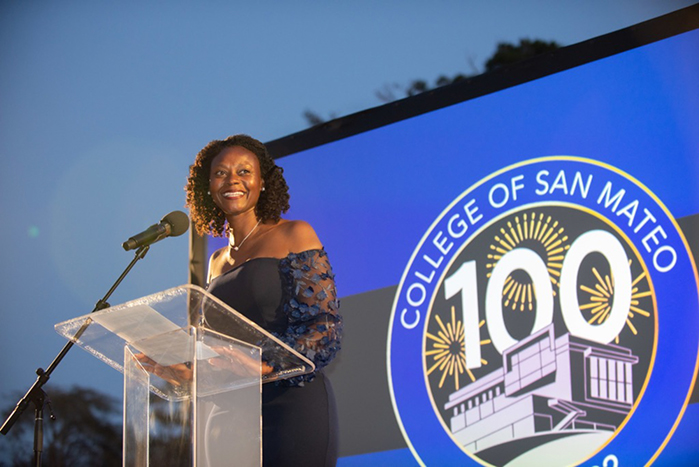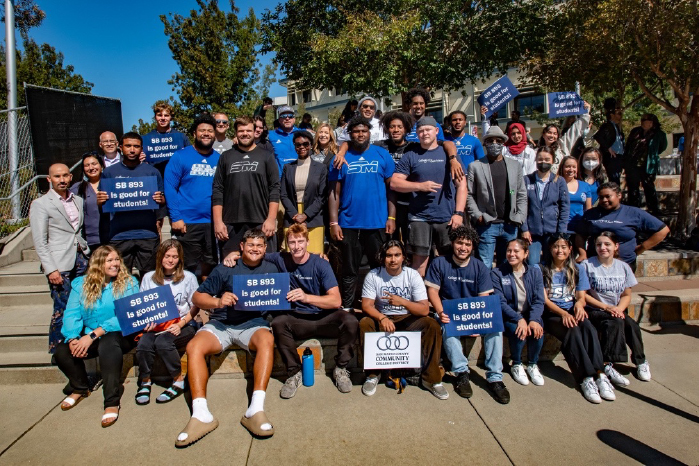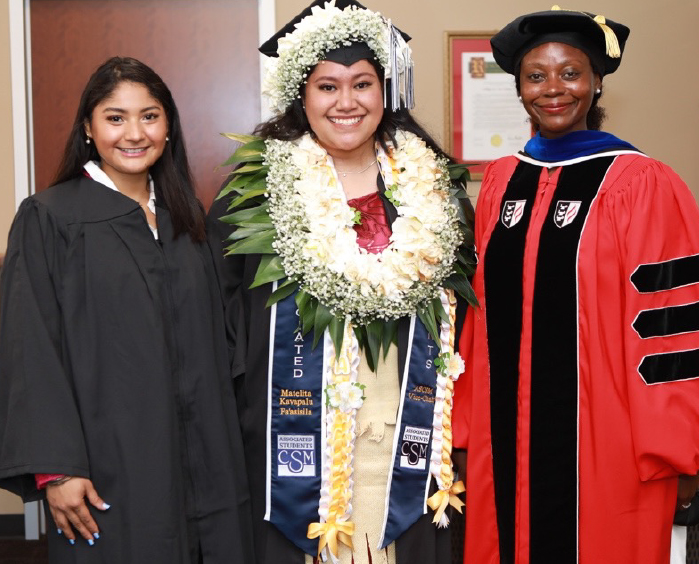
Dr. Jennifer Taylor-Mendoza
CSM’s 10th president aims for the college’s second century to be even more transformational than its first
Dr. Jennifer Taylor-Mendoza stepped up to her new role as College of San Mateo’s (CSM) president July 2021; she brings over twenty years of transformative educational leadership, much of it as an employee of the San Mateo Community College District (SMCCCD). She most recently served as Vice President of Instruction at Skyline College. With a long record of nurturing innovative programs, she reaffirms College of San Mateo as an instrument of generational uplift, stability, and equity.
Taylor-Mendoza is CSM’s first African-American president (or president of color) and third woman. Taylor-Mendoza has been in the SMCCCD for twelve years. She began as Learning Center Director at CSM and served as CSM’s Dean of Academic Support and Learning Technologies. She has served the district from director to president.
She is a scholar of education, focused on student self-efficacy, programs, and systems impacting success. She wrote her dissertation on African American student learning communities of the 1980s. She has supported the expansion of CSM’s learning communities, specialized cohort programs serving a range of students from communities of color to student-athletes, to honors scholars and youth involved with the justice system. These educational communities inspire students’ confidence and drive through mutual support, validation, and professional guidance.
More fundamentally, Taylor-Mendoza means to imbue CSM’s second century with deep reflection and reimagining of how best to serve the community and students, two-thirds of whom are first-generation college students and/or learners of color. She aims to uplift not just the student but their families and future generations. Although San Mateo County is wealthy by many benchmarks, persistent pockets of inequity still exist. Taylor-Mendoza is committed to ensuring access to education for all members of the communities CSM serves.
“Community college is for families a vehicle by which to achieve generational change,” Taylor-Mendoza said.
“Education quite literally has the power to move a family out of poverty; and it has the potential to establish economic viability and stability within communities,” she said. “I want CSM to be a cultural hub and primary resource by which individuals claim the opportunities they are entitled to.”
Taylor-Mendoza is mindful of her own history as a former community college student. She continues to mentor and regularly speaks to student groups about how they may reach their full potential. Taylor-Mendoza also serves on a number of local non-profit boards where she provides her expertise and advocates for community college as a powerful engine for equity and economic justice.
“It is important to remember one’s past in order to move forward,” she said. “As one learns to navigate the economic system, we must come back to bring others along.”

President Jennifer Taylor-Mendoza speaks at College of San Mateo’s Centennial Gala on March 31, 2022. Photo: Gino DeGrandis

Taylor-Mendoza surrounded by CSM students and employees at a SB 893 Free College rally. Photo: Gino DeGrandis

2022 Pre-Commencement Ceremony: Taylor-Mendoza with ASCSM President Andrea Morales (left) and Student Commencement Speaker Matelita Kavapalu.
“The work is about social and economic justice,” Taylor-Mendoza said. “It is about creating a healthy, vibrant community for all. CSM is the community’s college, a place where through education dreams are realized.”
She refers to the college’s socio-economic imperative as “minding the obligation gap”—the title of a book she co-wrote with other educators. The obligation is the institution’s. It is responsible to the students, ensuring equitable outcomes. The institution must hold itself accountable, revamping systems and enacting procedural changes for students’ benefit.
Authentic Care is Essential
As a young woman in Southern California, Taylor-Mendoza succeeded on her second try at community college, as she writes in the book Minding the Obligation Gap in Community Colleges and Beyond. A particular counselor demonstrated extraordinary care and concern. And Taylor-Mendoza bloomed to eventually earn a Ph.D. at Claremont Graduate University. A caring and supportive mother and grandmother also helped her flourish, and so did poetry. As a girl, she cherished Maya Angelou’s “Still I Rise.”
“Maya Angelou gave voice to my personal resiliency,” Taylor-Mendoza said. “Fall seven times stand up eight, even before I understood what that would mean—she gave voice to my experience as I found my own voice.”
College administration was not Taylor-Mendoza’s first career choice.
“I was interested in starting a private practice as a psychologist, but I was also interested in public policy. I took an opportunity to become a community college counselor and psychology professor.” This early experience excited her about the possibilities that community college creates for our youth. And over time, she gradually took on more institutional responsibilities eventually moving into administration.
In her first year as president, she has collaborated with college constituency groups to effectively establish a common college vision expressed in CSM Forward 2028, Education Master Plan. The vision succinctly stated is to deliver a liberatory education that inspires individual achievement and generational impact.
CSM’s shared vision sets the foundation for the college’s work into the next era.
As Taylor-Mendoza explains, “it takes brave leadership, authentic care, and civic consciousness to lead for transformative change. Equity-oriented, socially conscious educators must engage in critical self-reflection, evaluation, and revision of policies, practices, and procedures that impede students’ success. When we know better, we are obligated to do better. We measure our success by the positive impact we have on present and future generations, in crossing borders and expanding boundaries of understanding.”

